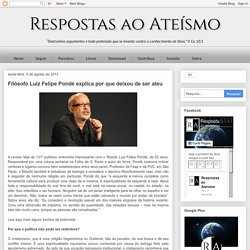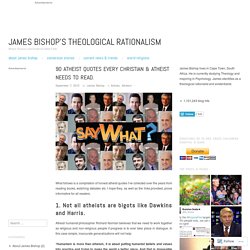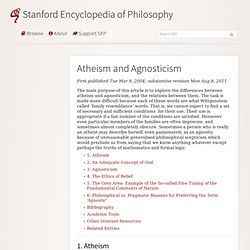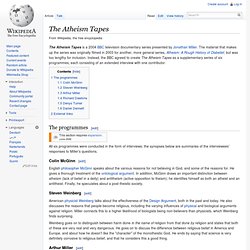

Dr Craig continues his discussion on Tim... - Reasonable Faith. Relatório diz que Portugal privilegia religião e discrimina ateus e livres-pensadores. A shambolic atheist community faces some tough choices. Respostas ao Ateísmo: Filósofo Luiz Felipe Pondé explica por que deixou de ser ateu. A revista Veja de 13/7 publicou entrevista interessante com o filósofo Luiz Felipe Pondé, de 52 anos.

Responsável por uma coluna semanal na Folha de S. Paulo e autor de livros, Pondé costuma criticar certezas e lugares-comuns bem estabelecidos entre seus pares. Professor da Faap e da PUC, em São Paulo, o filósofo também é estudioso de teologia e considera o ateísmo filosoficamente raso, mas não é seguidor de nenhuma religião em particular. Pondé diz que “a esquerda é menos completa como ferramenta cultural para produzir uma visão de si mesma. A espiritualidade de esquerda é rasa. Leia aqui mais alguns trechos da entrevista: Por que a política não pode ser redentora? O cristianismo, que é uma religião hegemônica no Ocidente, fala do pecador, de sua busca e de seu conflito interior. Em que o cristianismo é superior ao pensamento de esquerda? Pegue a ideia de santidade. Quando o cristianismo cruza o pensamento de esquerda, como no caso da Teologia da Libertação, a humildade se perde? Sim. 90 Atheist Quotes Every Christian & Atheist Need To Read. What follows is a compilation of honest atheist quotes I’ve collected over the years from reading books, watching debates etc.

I hope they, as well as the links provided, prove informative for all readers. 1. Stephen Hawking and God. Posted by John Lennox on November 23, 2010 Topic: Just Thinking Magazine In his latest book, the world’s most eminent physicist Stephen Hawking argues that the laws of physics, not the will of God, provide the real explanation as to how life on earth came into being.

Yet physical laws on their own cannot create anything; they are merely a description of what normally happens under certain given conditions. Although Hawking’s argument is being hailed as controversial and ground-breaking, it is hardly new. This article is based on one that appeared in the Daily Mail, September 3, 2010. It is an initial response to Stephen Hawking and Leonard Mlodinow’s book The Grand Design. In his latest book, the world’s most eminent physicist Stephen Hawking challenges belief in the divine creation of the universe. Although Hawking’s argument is being hailed as controversial and ground-breaking, it is hardly new.
Firstly, Hawking’s view of God is inadequate. Yet Hawking seems to think they did. 9 C. Richard Dawkins: The state needs to ‘protect’ children from religion…and their parents. March 4, 2015 (LifeSiteNews.com) -- Although there has always been contraception, its acceptance and practice by society as a whole is a relatively new phenomenon.

In the first part of the 20th century barrier methods became through mass production increasingly used. However, with the advent of the hormonal contraceptive pill in the 1960s the contraceptive era, ushering in the sexual revolution, really took off. The term “revolution” is by no means exaggerated, for the result was a fundamental change in the understanding of human sexuality in society. Atheism and Agnosticism. First published Tue Mar 9, 2004; substantive revision Mon Aug 8, 2011 The main purpose of this article is to explore the differences between atheism and agnosticism, and the relations between them.

The task is made more difficult because each of these words are what Wittgenstein called ‘family resemblance’ words. That is, we cannot expect to find a set of necessary and sufficient conditions for their use. Their use is appropriate if a fair number of the conditions are satisfied. Moreover even particular members of the families are often imprecise, and sometimes almost completely obscure.
Brights movement. Symbol of the Brights The Brights movement is a sociocultural movement that aims to promote public understanding and acknowledgment of naturalistic, unspiritual and irreligious worldviews, including equal civil rights and popular acceptance for adherents of such belief systems. It was co-founded by Mynga Futrell and Paul Geisert in 2003. The movement aims to create an Internet constituency that will pursue the following aims:[1] Promote the civic understanding and acknowledgment of the naturalistic worldview, which is free of supernatural and mystical elements;Gain public recognition that persons who hold such a worldview can bring principled actions to bear on matters of civic importance;Educate society toward accepting the full and equitable civic participation of all such individuals. The Brights movement distinguishes itself from traditional membership organizations by focusing on the development of a broad public constituency capable of including members of many narrower categories.
The Atheism Tapes. The Atheism Tapes is a 2004 BBC television documentary series presented by Jonathan Miller.

The material that makes up the series was originally filmed in 2003 for another, more general series, Atheism: A Rough History of Disbelief, but was too lengthy for inclusion. Instead, the BBC agreed to create The Atheism Tapes as a supplementary series of six programmes, each consisting of an extended interview with one contributor. The programmes[edit] All six programmes were conducted in the form of interviews; the synopses below are summaries of the interviewees' responses to Miller's questions.